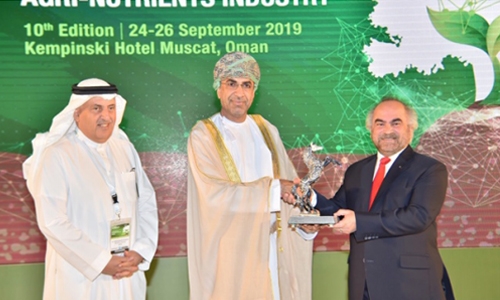Use fertilisers ‘properly’ to protect soil resources: Dr Jawahery
Gulf Petrochemical Industries Company (GPIC) President Dr Abdulrahman Jawahery has called on countries in the region to use fertilisers “properly” to help “protect soil resources”. This is “very important for the Gulf region”, Dr Jawahery said citing the harsh climatic conditions and scarce water resources here.
The demand for water in the GCC countries has increased by 140 per cent over the past decade, with 85 per cent of water resources consumed in agriculture and irrigation, Jawahery warned.
He, however, said the fertiliser industry is contributing positively by investing in water conservation projects across the region, reducing water and energy consumption for its operations, as well as working hard on the use of advanced technologies and best practices to reduce carbon emissions. Dr Jawahery was addressing the 10th annual fertiliser conference of the Gulf Petrochemical and Chemical Association (GPCA) in the Omani capital, Muscat.
Speaking at the opening session, Dr Jawahery, who is also the GPCA Vice Chairman, said the industry is now one of the most important sources contributing to the social and economic development in the region and has resulted in the creation of jobs and growth. He said the region is the largest exporter of urea with a global market share of 33 per cent.
The Gulf region is the second-largest source of DAP with 14 per cent of the total volume of exports in addition to being the largest exporter of ammonia with a global market share of 11 per cent.
‘Cautious optimism’
The industry, Dr Jawahery said, would continue to make progress until 2030. The fertiliser industry is expected to add an estimated 8.1 million tonnes of production, reaching 38.9 million tonnes until then.
On the global economy and its direct impact on the industry, Dr Jawahery said fertiliser consumption and demand are closely linked to GDP and population growth. The 3.1 per cent growth achieved globally in the past two years, he said, “had brought some cautious optimism to the fertiliser markets.” According to the World Bank, global growth is expected to slow over the next two years due to trade, investment and tight financing conditions.
2.1pc growth in GCC
Dr Jawahery said growth in the GCC countries is expected to increase to 2.1 per cent this year and 2.7 per cent the next year. “This will be supported by a rise in the fixed investment rate with the expectation of further growth for the economies of oil-importing countries.”
Need for technology
The African continent, one of the most important fertiliser import markets, will double its population requiring a significant increase in the global agricultural production beyond 70 per cent of current levels. The growth, he said, also put forward a unique challenge in the form of “land availability, groundwater depletion and shrinking agricultural workforce” calling for a need to harness new technologies.
He also reminded that the industry would need to invest more in research and innovation to meet the new trends. Dr Jawahery thanked Oman’s Minister for Agriculture and Fisheries His Excellency Dr Hamad bin Saeed Al-Awfi for his patronage and attendance of the event. The annual conference attracts prominent figures in the strategic industry in the Arab region and the world, in addition to fertiliser consumers and government representatives.
Related Posts

